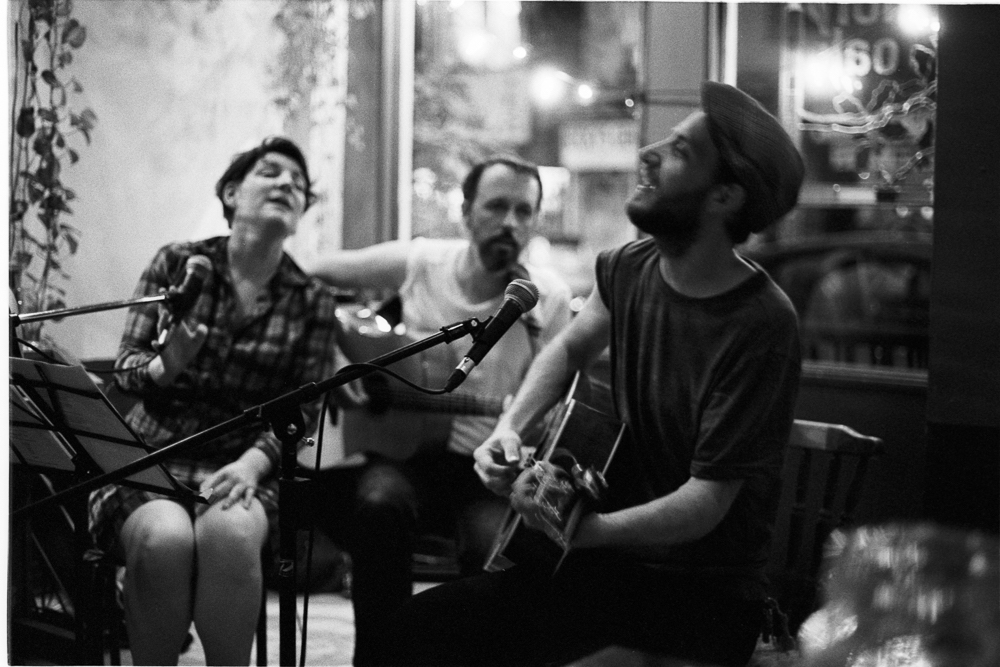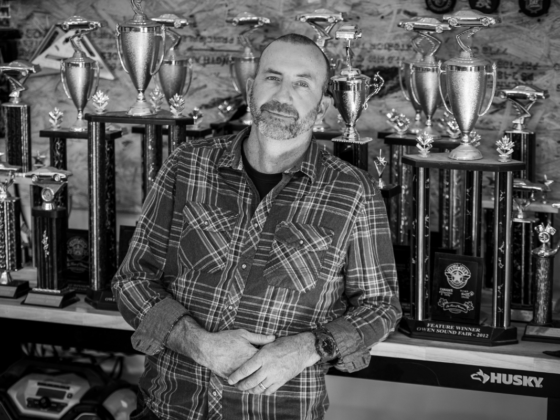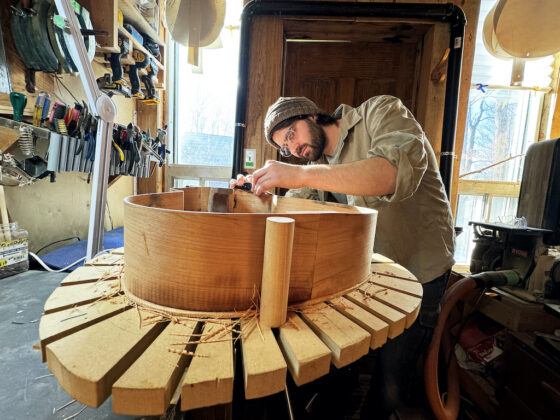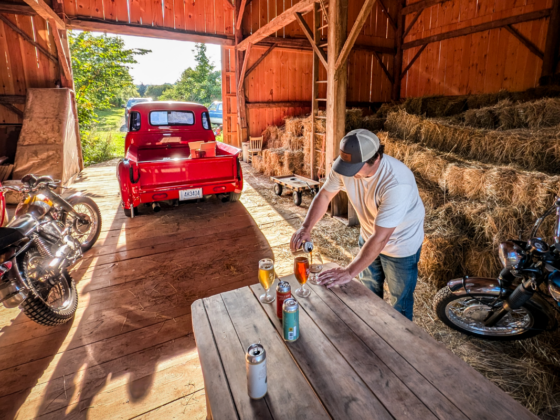I’m not the right person to be paying homage to Richard Laviolette. After his passing in September, it’s clear how many friends, family members and fans he had in this area – people who knew him well, who’ve been listening to his music from the beginning, and who know the intimate details of the songs. I never got the chance to meet Richard, and I consider that a tragedy. I think we would have got along well since we’re both of the same mindset that if ‘fussin’ and fightin’ is what you’re into/ then [we’ll] show you the door.”
That’s a line from his 2006 album A Little Less Like a Rock, A Little More Like Home, my first introduction to Laviolette. When some friends played me that album on a canoe trip up north in 2010, I knew it was one of those instances of the right album falling into my lap at the right time.

I hadn’t heard anything quite like Laviolette’s jarring melodies and warbling angst, a balancing act of conviction and vulnerability that seemed to combine all his teenaged influences, the likes of Neil Young, Radiohead, Rage Against the Machine, and Hayden (source) all thrown together into something new, yet something distinctly Grey County-sounding.
The energy bursting through songs like You’re Dead is visceral and still elicits chills, which is the highest compliment I can give artist. It’s an involuntary one and something I pay attention to. He delivers every line with an emotional investment, powering out both sorrow and joy from clever angles: “Staring coldly in the face/ of an infinite embrace/ holding bodies out in space where I can’t reach them/ time spent with me holds a certain melody/ where you make up all the words when I stop singing” he sings on You’re Dead, one of my favs.
This is music that grabs you by the collar and slaps you across the face, demanding your attention, and like every new musical discovery, I wanted more.
I had heard of an album that he’d written before A Little Less Like a Rock, A Little More Like Home called Mary Carl, but I had been told that it was very difficult to find. There was a bit of a mystery around it, and it seemed only the lucky few who got an original copy could enjoy the effort.
To understand the impact Laviolette has had, it’s important to understand what his music meant to local musicians, music-lovers, and friends. One who fits all three titles is Owen Sound’s Mike Vair-Haley, who first became friends with Richard when they both attended OSCVI in Owen Sound.
“When we were coming of age in the early 2000’s and trying to figure out what kind of people we were, Richard came out with Mary Carl. The deeply personal lyrics, dark mood and instrumentals were not like anything we were listening to at the time, but we gave it a chance because he was our friend. Falling in love with that album not only opened up a whole world of folk (anti-folk?) and more lyrically meaningful music, but also knowing he made that album in a bedroom inspired a lot of us to go and try to make something ourselves. We picked up guitars, wrote crappy songs, had a few drinks, and sang them to our friends. Most of those songs never made it anywhere but it didn’t matter; Richard’s inspiration helped us grow into more thoughtful and creative individuals.”

Mary Carl may not have been available to me in 2010, but, thankfully, the prolific songwriter that he was, Richard released two more albums around that time, one with the Hollow Hooves titled Aging Recycling Plant, and one with the Oil Spills called All of Your Raw Materials, that shed his 90s grunge influences for a more country and western sound. When I saw him live for the first time at Heartwood Hall in Owen Sound, it was the All of Your Raw Materials tunes I remember the most. I also remember the smile he wore – it lasted all night and shone from ear to ear. It was clear how much he loved performing for a ‘hometown’ crowd.
I put that in quotations, because it’s not clear to me which place Richard considered home. He moved to Guelph after high school, but he spent many of his formative years in Tara and went to high school in Owen Sound for a stint. He became known as a Guelph musician as his career unfolded, but when he came to play in Owen Sound, many of his family members would be in the crowd.
There was something special about the concert that night at Heartwood in 2016. At one point he asked all his family members to stand up – sure enough, half the room rose to the occasion, and by the end, the audience was holding hands and forming a human chain while Richard closed out the night with Funeral Song. It’s an upbeat, foot-stomping, clap-along kind of song, but with sombre undertones that have certainly become all too real since his passing.
It’s always been his melodies that grab me, but when I listen closely, his well-crafted lines are just as striking. He’s been called a “powerful performer” by Guelph’s Vish Khanna, and I think that’s also true of his music in general. It’s moving. It’s on fire with emotion.

By 2017’s Taking the Long Way Home, I was a legit Richard Laviolette fan and picked that one up on vinyl. On it, he returns to his childhood home in Tara with memories of his parents playing Old Country Music on Sunday mornings, his “mom singing in the kitchen,” him “sitting at the piano”.
“The house that I grew up in/ has long been forgotten/ But these memories are calling me home” he sings on Grey Rain to open the effort. This is where, in my humble opinion, he includes the most moving song he wrote: the beautiful, poignant, instructional Two Guitars. Maybe it came to me at the right time in my life, but when he sings the opening lines “I’m growing tired and little roughed up/ by the hands that deal and the hands that hold us up” it caught my ear right away. I was a little lost at the time and played that record a lot that year; it made me feel better, which is another true compliment I can give an artist – again, an involuntary response.
The instructional component is in the chorus, which advises that “Just singing the song doesn’t make it come true/ you gotta leave this house and write a few tunes”. It reminded me that any accomplishment doesn’t come easy – it takes action. It takes leaving the house and actually writing those songs. I wasn’t a songwriter, but I was a writer, and I needed that push to help finish some projects.
One of Laviolette’s most upbeat songs is titled, I Might Need Someone to Tell My Story When I’m Gone, which is what many are doing now that he’s passed. He decided to end his own life with dignity using MAiD (Medical Assistance in Dying) after symptoms from Huntington’s Disease worsened in 2023. Looking back on his catalogue, which is now fully available on Bandcamp, there are clear references to his worsening illness. For example, on the title track of Taking the Long Way Home, he tells us: ““My body runs like my parents’ van/ Back to the shop for a tune up again” and in Funeral Song he opens with: “When I decide to die or whenever/ all the folks that I fouled figure it’s my time.”
I can’t imagine Laviolette fouled too many people during his time on this planet, not from what I can gather. No, it was always more likely that he would decide when it was his time. And he did. But not without leaving a catalogue of music to enjoy, sheets of lyrics to ponder, and a smile so big it’s remembered ten years later.
Rest in peace, Richard Laviolette. Thanks for sharing your songs with us all.
Words Jesse Wilkinson
Photos provided by You’ve Changed Records












